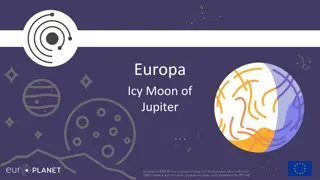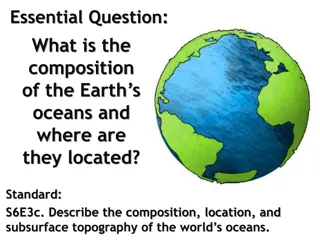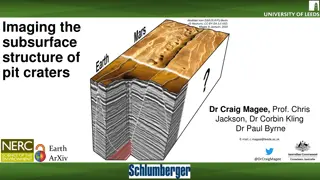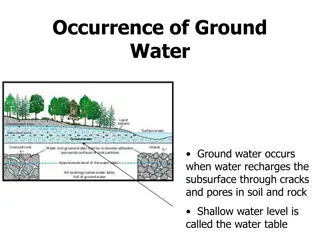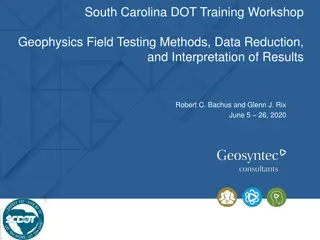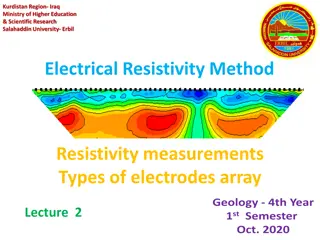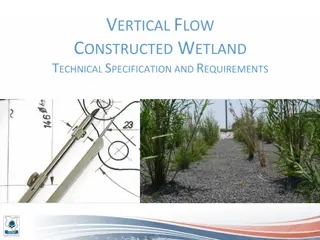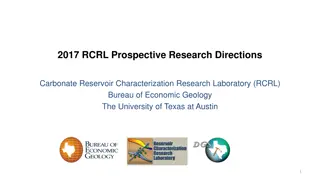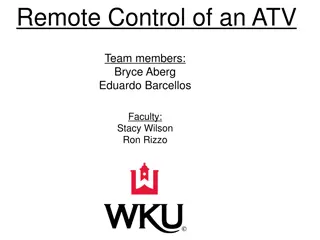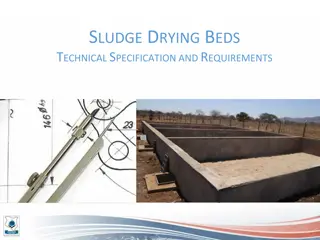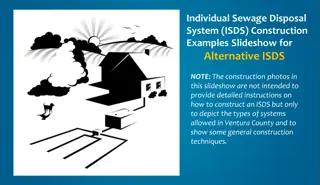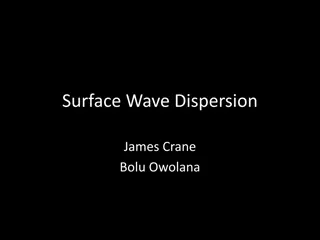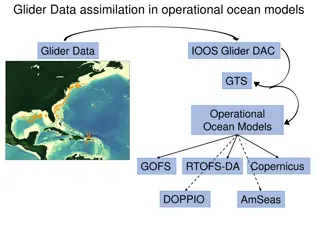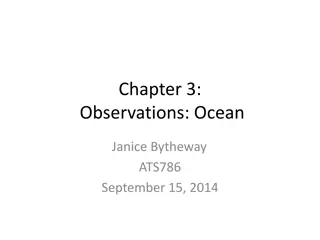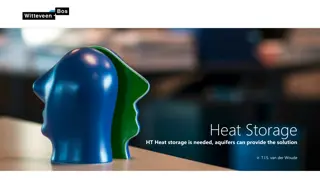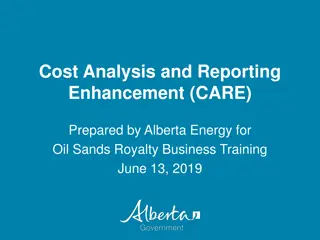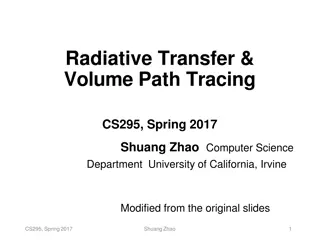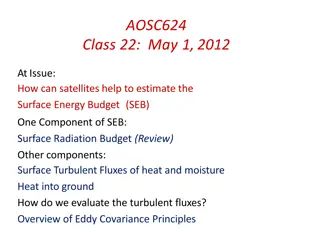Exploring Europa: Icy Moon of Jupiter and the Potential for Life
Europa, Jupiter's icy moon, offers fascinating insights into its composition, subsurface oceans, and potential for hosting extremophiles. Explore the geology, chaos terrain, and interaction between the ocean and crust. Could there be life on Europa? Learn how salt affects water freezing points and t
2 views • 12 slides
Exploring the Composition of Earth's Oceans
Delve into the composition, location, and subsurface topography of the world's oceans, discovering the chemical makeup of ocean water and its vast salt content. Uncover fascinating facts such as how the salt in the oceans could create a 500-foot thick layer if spread over Earth's land surface. Engag
1 views • 16 slides
Exploring Subsurface Structures of Pit Craters Through Seismic Reflection
Discover the technique of seismic reflection imaging to unveil the subsurface structures of pit craters on Earth and Mars. Follow the analysis of seismic data to map pit craters and their connections to geological features like dykes and fault jogs, shedding light on the formation processes of these
0 views • 11 slides
Understanding Groundwater: Occurrence, Recharge, and Movement
Groundwater occurs when water seeps into the subsurface through cracks and pores in rocks and soil, forming the water table. Recharge happens naturally through processes like precipitation and snowmelt, as well as artificially through methods like recharge wells and water spread over land. The movem
0 views • 8 slides
Geophysics Field Testing Workshop: Methods and Interpretation
This workshop on geophysics field testing covers a range of methods such as downhole and surface testing, spectral analysis, seismic refraction, and more. Geophysical investigations help assess subsurface properties efficiently and non-invasively, offering valuable insights for site exploration and
1 views • 16 slides
Understanding Resistivity Measurements in Geology
Explore the concept of resistivity measurements in geology, focusing on electrode configurations such as Wenner and Schlumberger arrays. Learn about the potential differences in electrode setups and how to calculate apparent resistivity through geometrical factors. Various electrode arrangements and
0 views • 22 slides
Vertical Flow Constructed Wetland Technical Specifications and Requirements
The technical specifications for a vertical flow constructed wetland include requirements for subsurface compacting, lining materials such as clay layers and plastic liners, perforation of pipes, watertight installation of underdrain pipes, central drainage channel design, and filter media compositi
0 views • 11 slides
RCRL Prospective Research Directions in Carbonate Reservoir Characterization
The RCRL group at the University of Texas at Austin specializes in research on carbonate reservoirs at various scales, from nanopores to basin architecture. They focus on developing predictive relationships and tools for reservoir characterization based on subsurface datasets and outcrop analogs. Th
1 views • 12 slides
Remote Control of ATV Team with myRIO and Shared Variables
Developing a remote control system for an ATV team using myRIO to manage functions like steering, throttle, choke, brakes, and start/stop via WiFi communication. Components like Haydon Motor Controller, Sabertooth 2x25 for steering, relays for brakes/start/stop, and shared variables enable efficient
0 views • 13 slides
Sludge Drying Beds Technical Specifications and Requirements
This document outlines the technical specifications and requirements for sludge drying beds. It covers aspects such as subsurface compacting, lining materials, underdrain pipes, filter media, and slabs. The beds are designed with specific slopes for drainage efficiency and proper placement below gro
0 views • 6 slides
Ventura County ISDS Construction Examples Slideshow
This slideshow showcases different construction stages of Individual Sewage Disposal Systems (ISDS) in Ventura County, providing an overview of the types of systems allowed and general construction techniques employed. From the installation of pressurized distribution beds to completed mounds with l
0 views • 15 slides
Understanding Surface Wave Dispersion in Seismic Exploration
Surface wave dispersion, explored by James Crane and Bolu Owolana, plays a crucial role in seismic studies. This phenomenon, involving waves spreading at varying speeds, helps evaluate subsurface characteristics based on wavelength. By studying surface waves, researchers can determine velocity, dens
0 views • 14 slides
Operational Ocean Modeling and Forecasting Systems
This content provides an overview of various operational ocean modeling and forecasting systems, including data assimilation processes, glider data, surface and subsurface data sources, forecasting models for hurricanes, and NOAA's hurricane forecasting models. It covers a range of technologies and
0 views • 16 slides
Multiphase Flows in the Upstream: A Comprehensive Overview
This content delves into the complexities of multiphase flows in the upstream sector, covering topics such as reservoir management, drilling, subsurface imaging, and reservoir modeling. It explores the challenges of multi-scale phenomena, multi-physics interactions, uncertainty, and inversion in the
0 views • 4 slides
Insights on Ocean Climate Change: Observations and Implications
Observations in this chapter highlight significant changes in ocean properties related to climate over the past 40 years. These changes include shifts in temperature, salinity, sea level, carbon levels, pH, and oxygen content. The patterns of change observed suggest a link between surface and subsur
0 views • 35 slides
Innovative Solution for Heat Storage Using Aquifers
Heat storage is crucial, especially during winter, and aquifers present a viable solution. By utilizing subsurface as an insulator and tapping into tertiary sand deposits, applications for shallow and deep geothermal energy are feasible. The concept of a Hot Water Battery offers an efficient means o
0 views • 12 slides
Cost Analysis and Reporting Enhancement (CARE) for Oil Sands Royalty Business
Enhance your oil sands royalty business with the Cost Analysis and Reporting Enhancement (CARE) program by Alberta Energy. CARE assists in assessing the effectiveness of the Royalty Regime, supports policy development, strategic planning, and forecasting processes. It provides project assessment, tr
0 views • 45 slides
Understanding Radiative Transfer and Volume Path Tracing
Explore the mathematical model of radiative transfer for simulating light scattering in participating media and translucent materials through volume path tracing. Learn about subsurface scattering and how radiance changes along ray segments in participating media. Delve into the origins and applicat
0 views • 44 slides
Satellite Applications in Estimating Earth's Surface Energy Budget
Satellites play a crucial role in estimating the Surface Energy Budget (SEB) by providing data on various components such as Surface Radiation Budget and Surface Turbulent Fluxes. The SEB includes factors like net radiation flux, sensible and latent heat fluxes, and subsurface heat transfer. Satelli
0 views • 38 slides
Understanding Classification of Discontinuities in Metal Processing
Classification of discontinuities in metal processing involves identifying interruptions in the normal physical structure, such as cracks, seams, and inclusions, which may or may not be defects. Discontinuities can be surface or subsurface, with surface ones being more likely harmful. The origins of
0 views • 29 slides
Deciphering Climate Variability Through Ocean Buoys Data Collection
Ocean buoys like TAO/TRITON provide valuable data on climate variability by measuring various parameters like sea-surface temperature, wind speed, humidity, and subsurface temperatures. Anomalies from normal conditions help identify patterns over time, aiding in understanding climate changes. Mainta
0 views • 5 slides
